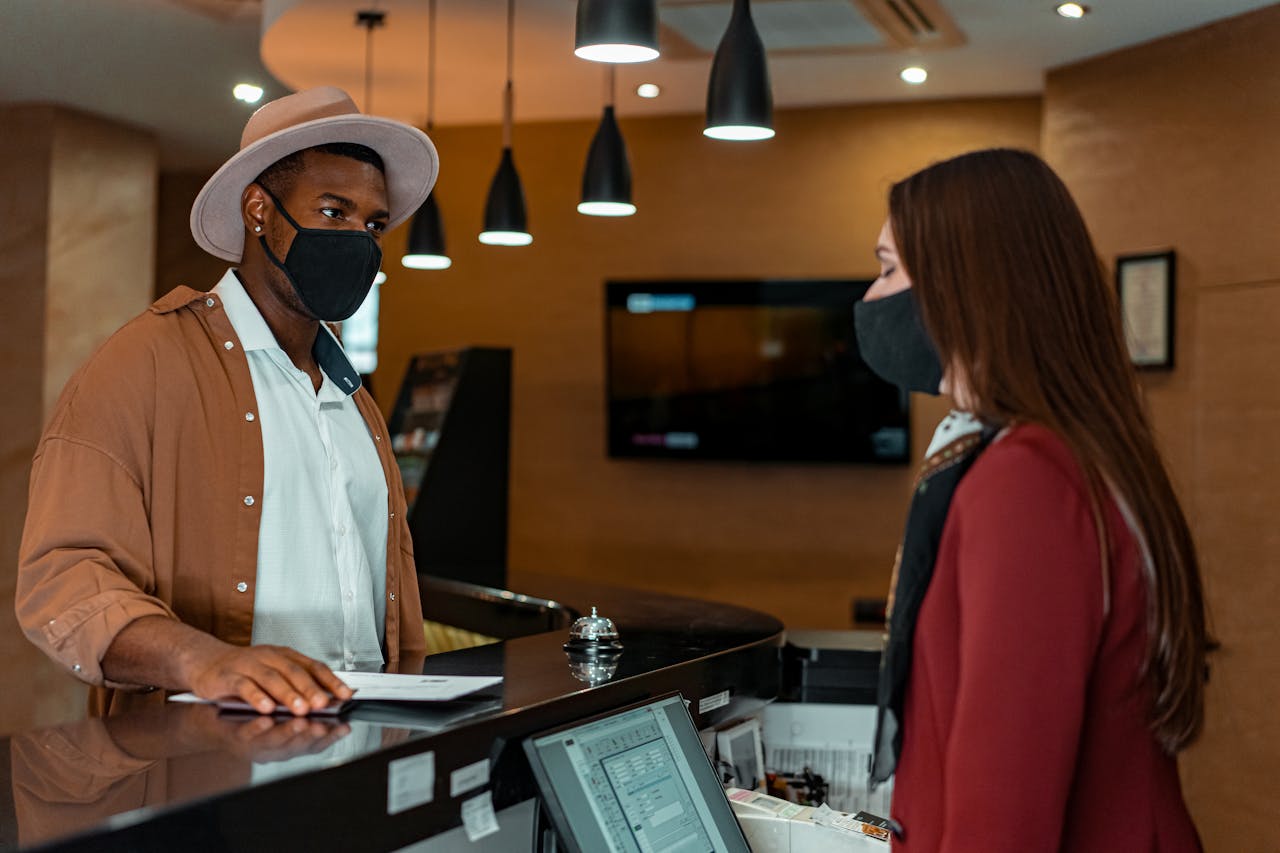The moment a guest steps into a hotel, a myriad of expectations for safety, privacy, and comfort converge, setting the stage for their stay. Amidst this confluence of expectations, the act of verifying a guest’s ID may seem like a minor checkpoint; however, it holds profound implications for the integrity and security of the hospitality environment. In an era where the anonymity afforded by digital transactions can obscure the identities of those we do business with, the hotel industry faces a critical challenge: ensuring that every individual walking through its doors is who they claim to be. This necessity transcends mere procedural formality, embodying a fundamental safeguard against the risks of fraud, security breaches, and legal liabilities.
The Importance of Verifying IDs in Hotels
Verifying the IDs of guests is a cornerstone practice within the hotel industry, serving multiple critical functions. Firstly, it ensures the safety of guests by confirming the identity of individuals accessing the premises, thereby deterring unauthorized access and potential criminal activities. This practice is vital in creating a secure environment where guests can relax without concern for their personal safety or the security of their belongings.
Moreover, ID verification plays a pivotal role in preventing fraud. It protects against identity theft and financial fraud by ensuring that the person checking in is the rightful owner of the reservation and payment information. In doing so, hotels safeguard their revenue and reputation, minimizing the risk of chargebacks and disputes that can arise from fraudulent transactions.
Additionally, complying with legal obligations is a significant aspect of ID verification in hotels. Many jurisdictions require hotels to maintain records of their guests’ identities as part of regulatory measures aimed at combating illegal activities, including terrorism financing, human trafficking, and exploitation. By diligently verifying IDs, hotels contribute to broader societal efforts to counter these grave issues, reinforcing the industry’s commitment to ethical operations and community safety.
Do Hotels Need ID of Both Guests?
A common query among hotel operators and guests alike revolves around whether hotels need to verify the IDs of all guests staying in a room. The answer, often dictated by hotel policies and legal requirements, leans towards yes for several compelling reasons. Verifying the IDs of all guests enhances the safety and security of the hotel environment by providing a complete account of who is staying on the premises. This information can be crucial in emergency situations, allowing for accurate guest accounting and assistance.
Furthermore, obtaining IDs from all guests supports the hotel’s legal and regulatory compliance efforts, ensuring adherence to laws that mandate guest registration. It also aids in dispute resolution and the protection of guests’ rights by accurately documenting who is involved in any incidents that may occur during the stay. Thus, while it may increase the check-in process’s complexity, the practice of verifying the IDs of all guests staying in a room is grounded in the prudent management of security, legal, and operational risks.
Can I Check into a Hotel with an Expired ID?
Guests often wonder about the acceptability of an expired ID when checking into a hotel. While policies can vary, the general stance within the industry is that valid, government-issued identification is required to verify a guest’s identity accurately. An expired ID may not be considered reliable for this purpose, as it could potentially facilitate fraudulent activities or identity misrepresentation.
Hotels adopt this policy not out of rigidity but as a measure to uphold security standards and protect against liability. However, recognizing that guests may sometimes find themselves in extenuating circumstances, some hotels may exercise discretion, allowing check-in under specific conditions or with additional verification steps. This approach underscores the industry’s commitment to guest service while maintaining the integrity of security practices.
Can You Check into a Hotel Without an ID?

The scenario of a guest arriving without valid identification is a situation that hoteliers must address with a blend of empathy and adherence to policy. While the standard requirement across the hospitality industry is for guests to present a valid, government-issued ID at check-in, exceptional circumstances can arise. Hotels face the challenge of maintaining security protocols while providing solutions for guests who, for various reasons, may not have their ID at the time of check-in.
Some hotels may offer alternative verification methods, such as verifying identity through secondary means or allowing a reservation to be held with a credit card until identification can be presented. However, these alternatives are not universal and typically depend on the hotel’s policies, the specific situation, and the perceived risk involved. This flexibility highlights the industry’s commitment to guest service but also underscores the paramount importance of security and legal compliance in hotel operations.
Do You Need an ID to Get a Hotel Room?
The requirement for an ID to book and check into a hotel room is a standard practice across the hospitality industry, serving as a foundational element of the hotel’s security and guest management protocols. This practice ensures that all guests are accurately identified, aiding in the protection of guests, staff, and property alike. It also facilitates the efficient management of guest reservations, the enforcement of age restrictions, and compliance with legal obligations that require hotels to maintain accurate records of their occupants.
The necessity of an ID for hotel room access is communicated through hotel policies and booking terms, which guests are typically made aware of during the reservation process. By setting clear expectations regarding ID requirements, hotels can minimize check-in complications and enhance the overall efficiency of guest service operations. This transparency not only reinforces the hotel’s commitment to security but also ensures guests are prepared for a smooth check-in experience upon arrival.
Legal Requirements for ID Verification in Hotels
The legal landscape governing ID verification in hotels is shaped by a complex array of laws and regulations that vary by jurisdiction. These laws often mandate that hotels collect and maintain certain information about their guests, including name, address, and identification details, as part of broader efforts to ensure public safety, combat illegal activities, and support law enforcement efforts. Failure to comply with these legal requirements can expose hotels to penalties, legal action, and reputational damage, underscoring the critical importance of diligent ID verification practices.
Hotels must navigate these legal obligations with a keen understanding of the specific requirements applicable to their operations, which may include mandates on data collection, storage, and sharing with authorities under certain conditions. Ensuring compliance requires not only a robust system for ID verification at check-in but also policies and procedures for the secure handling of guest data. Regular training for hotel staff on legal requirements and privacy practices further reinforces the hotel’s commitment to both guest privacy and regulatory compliance.
Implementing Effective ID Verification Processes
For hotels to effectively navigate the complexities of ID verification, establishing clear, efficient, and guest-friendly procedures is essential. This involves integrating ID verification seamlessly into the check-in process without causing undue delay or inconvenience to guests. Utilizing technology, such as digital check-in systems that allow for secure uploading of ID documents before arrival, can streamline this process while maintaining high security standards. Additionally, training staff to handle ID verification sensitively, respecting guest privacy and explaining the purpose behind these requirements, enhances the guest experience by fostering an atmosphere of trust and professionalism.
Addressing Common Concerns About ID Verification
Hotel guests may have valid concerns regarding the necessity of ID verification, ranging from privacy issues to the handling of their personal information. Addressing these concerns transparently and proactively is vital for maintaining guest trust. Hotels should clearly communicate the reasons behind ID verification requirements, including legal obligations and the benefits to guest security. Furthermore, reassurances about the secure handling and storage of personal information, emphasizing the temporary nature of data collection and the strict access controls in place, can alleviate privacy concerns. Providing guests with this information at the time of booking and upon arrival ensures they are informed and comfortable with the process.
Conclusion
Navigating guest privacy laws in the hotel industry is a delicate balancing act that requires a thorough understanding of legal requirements, a commitment to guest privacy and security, and the implementation of effective and respectful ID verification processes. By embracing these principles, hoteliers can build a foundation of trust with their guests, ensuring a secure and welcoming environment that respects individual privacy and complies with legal standards.
Take action now to review your hotel’s ID verification processes, ensuring they are efficient, respectful, and legally compliant. Embrace the opportunity to enhance your guest experience through transparent communication and the sensitive handling of personal information. Let’s make every guest’s stay safe, secure, and memorable.

